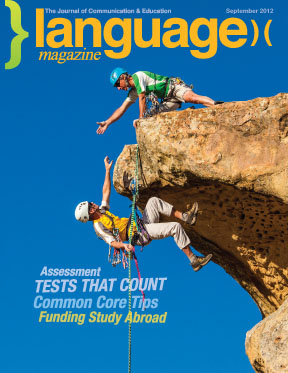Developing Assessment
Harvard University’s recent revelation that it was investigating a case of widespread cheating may have confirmed many people’s suspicions but it must be seen within the wider context of the increased emphasis on testing and the consequence of results.
Increased competition for admission into universities and graduate schools has made students more willing to do whatever it takes to get the grades they need. This is not only true of American students. International students desperate to fulfill their parents’ dream of attending a prestigious U.S. university are prepared to risk years of hard work and set themselves up for a miserable college career by fraudulently “passing” English proficiency exams (see College Assessment p.19). Great strides are being made to combat test fraud but we also need to examine why students cheat.
And, it’s not only in higher education that exam results are vital to success. A s high stakes testing has spread throughout our schools, grades, rather than education, have become the major focus of not only students but educators and administrators also, leading to widespread manipulation of results which has undermined school districts across the nation.
Maybe we shouldn’t be surprised that kids cheat when they are see the example of athletes, politicians, and bankers who will stop at nothing to win. What we really need to do is create an environment in which we emphasize the formative side of assessment and students are empowered to use their results to help them succeed in their overall objective of education.
Of course, we need tests. It is essential for us to measure progress and teaching efficacy. And relatively frequent assessments certainly help to motivate some students. But, we must beware of placing so much emphasis on tests that nothing else matters.
Aside from cheating and fraud, the consequences of making testing stakes too high include the temptation or requirement to “teach to the test,” and exacerbating the problem of students who freeze. Some students are prone to panic and self-doubt. Expectations make them so worried about failure that they are unable to organize their thoughts under the pressure of a high stakes testing.
Other people do well on tests and those people, thanks to the reliance our society places on exam results, are often involved in the decisions to place even more emphasis on such results. But, we also need to recognize that some students do not react well to traditional testing environments and develop assessments that take this into account. Fortunately, assessment companies are constantly researching and developing models and methodologies to improve their capacity. It is up to policymakers to recognize that in the same way students have different learning styles, they need different testing styles. And, some alternative testing styles may be more suited to modern society.
Many of the accused cheaters at Harvard merely worked with fellow students and their instructors to try to understand difficult questions. They worked with their peers to come up with a solution — an extremely valuable skill in the workplace. We need to widen our narrow measurement criteria to take into account different working practices and the diversity of people that take tests.
IN THIS ISSUE:
Making Dreams Come True
Tim Conrad on counseling DREAM Act students
Confirming Your English Identity
Lisa Hagan takes the mystery out of biometric testing for international English language test takers
Cutting to the Common Core: Tips From the Top
Margo Gottlieb offers tips for teachers and school leaders on how to integrate the Common Core standards and English Language Learners
Growing Pains
Adelina Alegria and Candace Kelly-Hodge assess how the new Race to the Top District (RTT-D) competition over-relies on student growth measures
Growing Gains
Diane Glass explains why measuring reading growth should be a top priority for educators
From C to Shining B
Kristal Bivona reports on the challenges revealed by the Nation’s Report Card
Travel Pays
Language Magazine discovers scholarship options for study abroad
Last Writes Richard Lederer is Tense with Verbs



